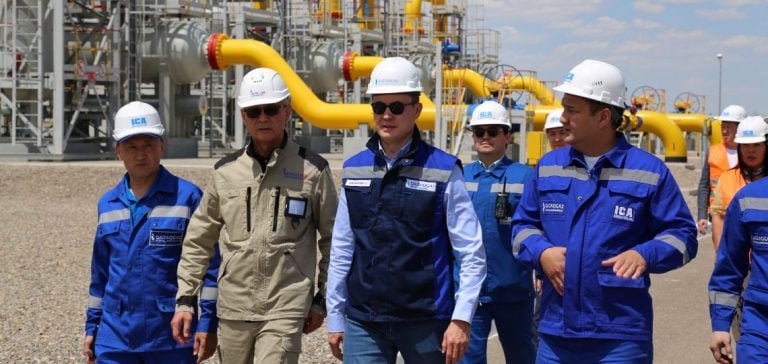The international operator of the Kashagan oil field in Kazakhstan has rebuffed projections by the national gas company, QazaqGaz, that additional oil output would result from building new gas processing facilities. The operator, North Caspian Operating Company (NCOC), emphasized that QazaqGaz should focus on its primary role in executing these infrastructures, which are significantly behind schedule.
This statement comes after QazaqGaz CEO Sanzhar Zharkeshov asserted that oil output from Kashagan would increase by 25,000 barrels per day (b/d) for every billion cubic meters per year (Bcm/year) of gas processing capacity added. These ambitions are part of an ambitious expansion plan by QazaqGaz aimed at reaching an interim target of 500,000 b/d of oil production.
Kashagan, currently producing around 400,000 b/d, is the second-highest contributor to Kazakhstan’s oil exports, primarily through the port of Novorossiisk on the Black Sea. The CPC Blend oil has recently sold at prices close to the Platts Dated Brent benchmark, reflecting the light sweet quality of the crude.
Delays in Processing Facilities
However, progress in increasing oil output has been slow, partly due to disputes over alleged environmental violations and the recovery of development costs. NCOC comprises ExxonMobil, Shell, TotalEnergies, Italy’s Eni, China’s CNPC, Japan’s Inpex, and state-owned KazMunaiGaz, none of which hold any stake in QazaqGaz, but are involved in adding gas processing capacity.
Zharkeshov’s comments may reflect a broader impatience with the lack of progress on raising Kashagan production, as expressed in a recent national development plan, as well as national gas supply goals.
Delayed Construction of Facilities
Zharkeshov has described the addition of new gas processing facilities as the main means of increasing oil production from Kashagan. His company is already constructing a 1 Bcm/year processing plant as part of the first phase of Kashagan development. However, that construction is delayed: it was only 23% complete as of August, according to a statement from the prime minister’s office, and is now due to be operational in the second quarter of 2026, instead of the first quarter of 2025 as initially planned, according to KazMunaiGaz.
Moreover, NCOC has yet to make a final investment decision regarding a proposed phase 2 expansion of Kashagan, which is expected to be split into two parts: A and B, with part A aimed at helping achieve the production goal of 500,000 b/d.
QazaqGaz’s widely publicized plans for additional gas processing plants to support phase 2—and Zharkeshov’s forecasts of how much oil this will bring—have yet to be endorsed by NCOC.
Growth Perspectives and Collaboration
“NCOC will continue to contribute to Kazakhstan’s economy over decades of production,” NCOC stated. The company, along with its shareholders, partners, and authorities, “continues to study opportunities for further growth,” it added. “In this context, cooperation with QazaqGaz will allow NCOC to increase oil production when QazaqGaz focuses on delivering the gas processing plant, while NCOC will concentrate on upstream operations.”
QazaqGaz has taken an increasingly public stance on Kashagan growth, following its signing of deals in 2024 with a Qatari entity, UCC Holding, for the construction of two gas processing plants dedicated to Kashagan gas, with capacities of 1 Bcm/year and 2.5 Bcm/year, and commissioning expected in 2026 and between 2028 and 2029, respectively.
Zharkeshov described the planned additional plants as a “win-win” for all sides that would bring additional gas and oil production. According to sources close to the situation, the gas is expected to be provided to the plants by NCOC for free.
NCOC has previously identified its primary task under the proposed 2A expansion as constructing a gas pipeline from the offshore field to the planned onshore gas processing facilities. However, it remains unclear if there is unanimity within NCOC regarding how much gas may be released to the domestic grid, as opposed to reinjecting gas to maintain reservoir pressures and maximize oil recovery.
Kashagan is currently undergoing a month-long planned maintenance shutdown, announced by NCOC on October 7. This planned shutdown has sparked discussions as it is central to Kazakhstan’s plans to compensate for exceeding quotas under its membership in the OPEC+ producer group.
Platts, part of Commodity Insights, last assessed CPC Blend at a 45 cents/barrel discount to Dated Brent on October 11.






















